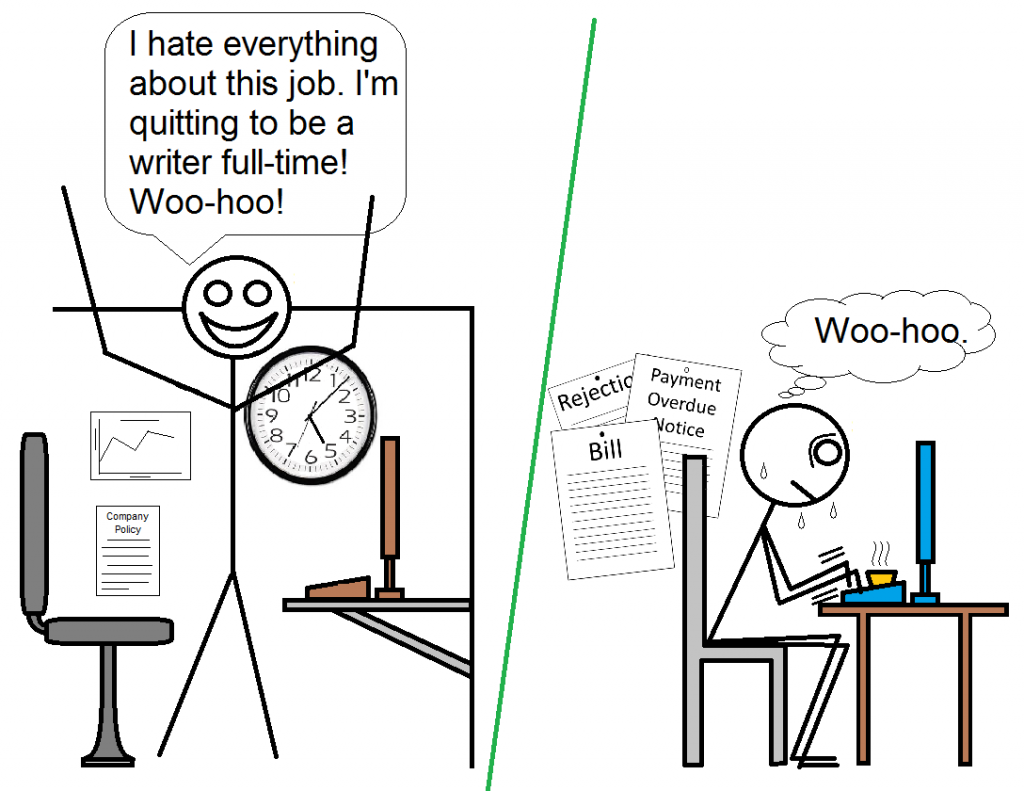If you work at a typical desk job and want to write fiction at night, be prepared. The two occupations are not at all alike. But what if your day job suddenly got altered to be more like fiction writing? Let’s find out what that would be like.
You wake up at whatever time you like; you’re now setting your own hours. There’s no commute. You telework every day. No one sees you working, or checks on your progress. There are no meetings, no boring chats by the coffee machine, and no lunches with clients. Knock off early every day if you want; nobody cares how long you work.
Sounds like a dream job, right? There’s a down side.
 Sitting at your computer, you produce your first work product of the day. (What’s the product? I don’t know; we’re talking about your current day job.) You e-mail it to your boss and wait. A few hours later, your boss e-mails you back to say the product didn’t suit her needs. She says she can’t accept it.
Sitting at your computer, you produce your first work product of the day. (What’s the product? I don’t know; we’re talking about your current day job.) You e-mail it to your boss and wait. A few hours later, your boss e-mails you back to say the product didn’t suit her needs. She says she can’t accept it.
You’re stunned. She’s rejected your work. How can she do that? You know this job well and have worked at it for years. You e-mail her back asking what sort of product she needs, and asking what’s specifically wrong with the one you sent. She answers that she’s looking for really compelling products the customer will like. Moreover, she receives too many product submissions to list the deficiencies with each one; she only has time to accept or reject.
Her e-mail concludes on a positive and unexpected note, wishing you well with the product, adding that you can submit to any other department head in the company. That’s weird, you think. It’s as if, all of a sudden, you have more than one boss.
With some trepidation, you submit the work product to another department head. An hour later, he responds, thanking you but also saying it doesn’t suit his needs. You’re disappointed, but not shocked. By now, you’re catching on to the new company procedure and you simply submit your product to a different department head.
During the next two weeks, you submit it to every department head and all of them reject your product. Some take less than an hour to respond, but others take days. While waiting on them, you’ve been able to do other stuff around the house, watch some movies, and hit the bar scene on a few nights. The rejections distress you, though; things never used to be that way.
Ah, well, at least it’s payday, finally. Checking your bank account, you’re stunned to discover there’s been no money deposited to your account. You call the Pay Department, and the representative explains you had no products accepted during the pay period, so there’s no pay. The company is no longer on a salary system; they pay you only for accepted products, and calculate the amount based on customer purchases.
Hanging up the phone, you have a “We’re not in Kansas anymore” moment. In this new system, you realize you’ll have to churn out products fast, keep circulating them, and hope a few get accepted and that customers like them.
E-mailing a few friendly co-workers, you discover most are in the same boat, with zero pay. Word has it that one employee tripled her monthly income, but was told that was no guarantee of future earnings.
Welcome, fellow worker, to the fiction writing biz, where success is rare, and determined in part by how well you learn your craft and whether a fickle public likes your stories. You can complain the system’s unfair or rigged, but whining probably won’t make you feel better, and sure won’t change anything.
Fortunately, day jobs aren’t set up like the writing business. Still, writing makes a highly enjoyable hobby for most authors. Among them is—
Poseidon’s Scribe

 You’ve been writing fiction as a hobby at home for some time now, and have sold a few stories, received payment as a published author. What if…
You’ve been writing fiction as a hobby at home for some time now, and have sold a few stories, received payment as a published author. What if…